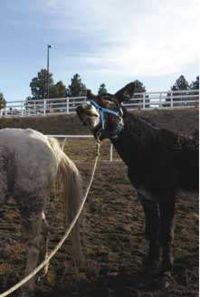Difference between revisions of "Breeding In-hand - Donkey"
(No difference)
| |
Latest revision as of 10:49, 25 October 2010

The space and freedom of interaction between the jack and the jenny seems to be a key factor in sexual stimulation. The time to first mount increases if the jenny is restrained (Henry et al, 1991; Gastal et al ,1996). It is recommended that enough space be provided during in-hand mating of a jenny for the retreating behaviour to take place.
The alternating slow/fast approach and retreat to and from the jenny is a unique behaviour in jacks (Henry et al, 1998; Lodi et al, 1994). The number of retreats is generally higher for the first ejaculation than for successive ejaculations (Gastal et al, 1996). The presence of other receptive jennies may enhance the sexual stimulation, whereas the presence of other jacks may distract or inhibit sexual activity given the territorial nature of this species (Kreuchauf, 1984). The time from introduction to a female to mounting and ejaculation varies from 6 to 32 minutes according to studies (Tibary, 2006).
During the pre-copulatory and copulatory phases, jacks exhibit a sequence of behaviour including nose-to-nose contact, flehmen responses, mounting without erection, partial and total exposure of the penis, sniffing and biting specific areas of the female’s body, lip clapping and slow/quick retreats with vocalization. These behavioural parameters show significant individual variations.
The frequency of flehmen response (usually five to eight times) is generally higher than in stallions and does not seem to be affected by rank of ejaculation. The initial reaction of the jack in the breeding shed is vocalization, followed by one or several mounts without erection. The first mount is performed without erection in 70% of the cases. The number of mounts without erection varies from one study to another and is probably affected by training and handling differences (Tibary, 2006).
Frequent partial exposure of the penis during the pre-copulatory phase is common in jacks (Kreuchauf, 1984; Henry et al, 1998; Henry et al, 1991). Total exposure of the penis is generally followed by erection (Gastal et al, 1996). The first erection does not always result in ejaculation. Jacks may show several erections and masturbation before mounting and ejaculation. The mean time from first contact with the jenny until the first erection varies between 10 and 15 minutes. Depending on individual animals, stallions display four to eight pelvic copulatory movements before ejaculation.
A seasonal effect on libido has been reported by some authors with decreased latency to first mount, first erection and ejaculation during spring and summer (the breeding season). This seasonal effect may vary from one region to another (Tibary, 2006).
It is the experience of the authors ( Tibary, A., Sghiri, A. & Bakkoury, M.) that breeding jacks to mares is more challenging with often increased latency to erection, mount and ejaculation.
In pasture breeding systems, lack of conditioning of jacks to breed mares may result in lower reproductive efficiency. It has been suggested that jacks destined for mule production should be raised with horse fillies after weaning, and prevented from any contact with jennies until they are adult (Henry et al, 1998; Henry, 2001).
In pasture, pre-copulatory, copulatory and post-copulatory behaviour for stallions breeding with mares is similar to that for stallions breeding with jennies (Lodi et al, 1994). The interaction between mares and stallions is reportedly shorter in duration but more frequent. Also, jacks seem to elicit signs of oestrus from mares with less intensity. In one study the percentage of oestrous mares exhibiting signs towards a jack varied from 28 to 43% whereas 93% exhibited sexual behaviour to stallions (Lodi et al, 1994; Henry, 2001).
In a stud farm situation, we have observed latency to erection and ejaculation of up to 120 minutes when breeding hobbled oestrous mares (Tibary et al, 2005). In addition to behavioural differences that may affect fertility results, size discrepancy may be another constraint in stallion/ mare breeding.
Literature Search
Use these links to find recent scientific publications via CAB Abstracts (log in required unless accessing from a subscribing organisation).
Donkey mating behaviour publications
References
- Tibary, A., Sghiri, A. & Bakkoury, M. (2008) Reproduction In Svendsen, E.D., Duncan, J. and Hadrill, D. (2008) The Professional Handbook of the Donkey, 4th edition, Whittet Books, Chapter 17
- Gastal, M.O., Henry, M., Beker, A.R., Gastal, E.L., and Goncalves, A. (1996). ‘Sexual behavior of donkey jacks: influence of ejaculatory frequency and season’. Theriogenology 46. pp 593-603.
- Henry, M. (2001). ‘Some reproductive characteristics of donkeys’. Pratique Vétérinaire Equine 33. pp 11-20.
- Henry, M., McDonnell, S.M., Lodi, L.D., and Gastal, E.L. (1991). ‘Pasture mating behaviour of donkeys Equus asinus at natural and induced estrus’. J. Reprod. Fertil. Suppl 44. pp 77–86.
- Henry, M., Lodi, L.D., and Gastal, M.M.F.O. (1998). ‘Sexual behaviour of domesticated donkeys (Equus asinus) breeding under controlled or free range management systems’. Applied Animal Behaviour Science 60. pp 263-276.
- Kreuchauf, A. (1984). ‘Reproductive physiology in the jackass’. Anim Res Devel 20. pp 51-78.
- Lodi, L.D., Henry, M., Paranhos, D.A., and Costa, M.J.R. (1994). ‘Behavior of donkeys (Equus asinus) breeding mares (Equus caballus) at pasture’. Biol. Repro. Mono 1. pp 591-598.
- Tibary, A. (2006). ‘Normal and abnormal behavior in the male equine’. Current Therapy in Equine Reproduction, J.C. Samper, A. McKinnon and J. Pycock (eds). Saunders, in Press.
- Tibary, A., Bakkoury, M., Anouassi, A., and Sghiri, A. (2005). ‘Examen et évaluation de l’aptitude à la reproduction’. Reproduction Equine Tome II: L’ Etalon. A. Tibary, M. Bakkoury (eds). Actes Editions, IAV Hassan II, Maroc, 2005. pp 167-174.
|
|
This page was sponsored and content provided by THE DONKEY SANCTUARY |
|---|
